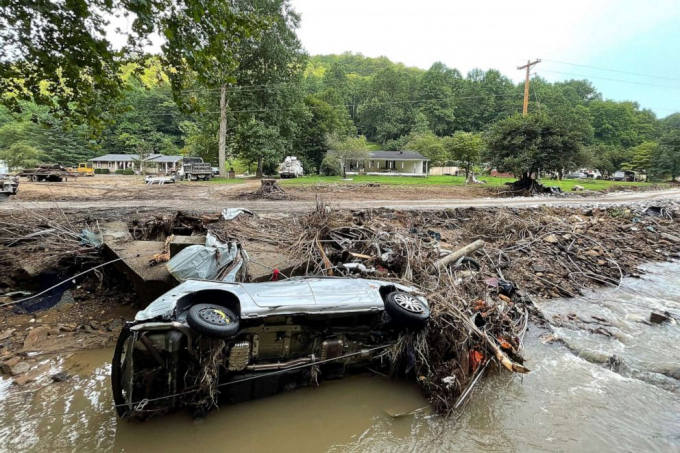November 24, 2025 | 15:37 GMT +7
November 24, 2025 | 15:37 GMT +7
Hotline: 0913.378.918
November 24, 2025 | 15:37 GMT +7
Hotline: 0913.378.918

A car washed into the Squabble Creek by the floods in Buckhorn, Ky., Aug. 5, 2022.
Scientists have made a distressing discovery on how global warming will affect known infectious diseases.
Climate hazards are expected to aggravate 58% of all known human pathogens, according to a study published Monday in Nature Climate Change. That's over half of infectious diseases discovered since the end of the Roman Empire, Camilo Mora, a data analyst and associate professor in the Department of Geography and Environment at the University of Hawaii Manoa, told ABC News.
While the impact that climate change can have on human vulnerability to a range of diseases has been well accepted, the full threat climate change poses to humanity in the context of disease was unknown, according to the researchers. Past studies have primarily focused on specific groups of pathogens, such as bacteria or viruses, the response to certain hazards, such as heatwaves or increased flooding, or transmission types, such as food or water-borne.
Mora's team systematically screened literature that revealed 3,213 empirical cases linking 286 unique, human pathogenic diseases to 10 climate hazards, such as warming, floods or drought. Of these, 277 pathogens were found to be aggravated by at least one climate hazard, with only nine pathogens "exclusively diminished" by climatic hazards, according to the study.
A whopping 58% of an authoritative list of infectious diseases documented to have impacted humanity have already been shown to be aggravated by climatic hazards -- a finding the researchers found "shocking," Mora said.
Examples of hazards include those that bring humans closer to pathogens, such as storms and floods, which then cause displacements associated with cases of Lassa fever or Legionnaires’ disease.
Other examples are events that bring pathogens closer to humans, in which warming increases in areas over which organisms that transmit diseases, such as Lyme disease, dengue and malaria, are active.
There is a broad taxonomic diversity of human pathogenic diseases, such as bacteria, viruses, animals, plants, fungi and protozoa, as well as transmission types -- for example, vector-borne, airborne, direct contact -- that can be affected by warming, heat waves, droughts, wildfires, extreme precipitation, floods and sea level rise, according to the study.
Shifts in the geographical range of species are one of the most common ecological indications of climate change, according to the study. Warming and precipitation changes, for instance, were associated with range expansion of vectors such as mosquitoes, ticks, fleas, birds and several mammals, which then were implicated in outbreaks by viruses, bacteria, animals and protozoans, including dengue, chikungunya, plague, Lyme disease, West Nile virus, Zika, trypanosomiasis, echinococcosis and malaria.
The researchers found 1,006 unique pathways in which climatic hazards, via different transmission types, resulted in cases of pathogenic diseases.
Warming at higher latitudes have allowed vectors and pathogens to survive winter, aggravating outbreaks by several viruses, such as an anthrax outbreak in the Arctic circle that may have stemmed from an ancient bacterial strain that emerged from an unearthed animal corpse as the frozen ground thawed, according to the study.
COVID-19 is an example of how one single disease can create a thematic change in society, Mora said, adding that he does not believe the most recent pandemic -- and the animal-to-human transmission that likely caused it -- could have happened without global warming.
This research reveals more evidence that humans will have difficulty adapting to climate change, especially those in developing countries, Mora said.
"The magnitude of the vulnerability when you think about one or two diseases -- okay, sure, we can deal with that," he said. "But when you're talking about 58% of the diseases, and 58% of those diseases can be affected or triggered in 1,000 different ways. So that, to me, was also revealing of the fact that we're not going to be able to adapt to climate change."
Extreme weather events such as drought and wildfire in the West, flooding in both inland and coastal areas and extreme heat in places that previously did not experience such high temperatures are becoming more common, Mora said.
The findings reveal unique pathways in which climatic hazards can lead to disease, underlining the limited capacity for societal adaptation, and emphasizing the need to reduce greenhouse gas emissions, the authors said.
(ABC News)

(VAN) Brazil's COP30 presidency pushed through a compromise climate deal on Saturday that would boost finance for poor nations coping with global warming but that omitted any mention of the fossil fuels driving it.

(VAN) Poultry farmers in the UK have been warned that they could face one of the worst winters yet for bird flu.

(VAN) Prices of main-crop paddy have risen sharply, with jasmine rice hitting 16,100 baht per tonne — the highest level in years.

(VAN) In Brazil, FAO unveiled a series of reports and initiatives showing how sustainable agrifood systems are a solution to the climate crisis.

(VAN) With names like neodymium and dysprosium, rare-earth elements sound exotic — and their perceived scarcity has only added to the mystique.

(VAN) In a new study published in Trends in Biotechnology, researchers used a gene-editing technology called CRISPR to increase a fungus's production efficiency and cut its production-related environmental impact by as much as 61%- all without adding any foreign DNA.

(VAN) A top official in Beijing’s Cop delegation says China is committed to clean energy – but US’s absence is a problem.